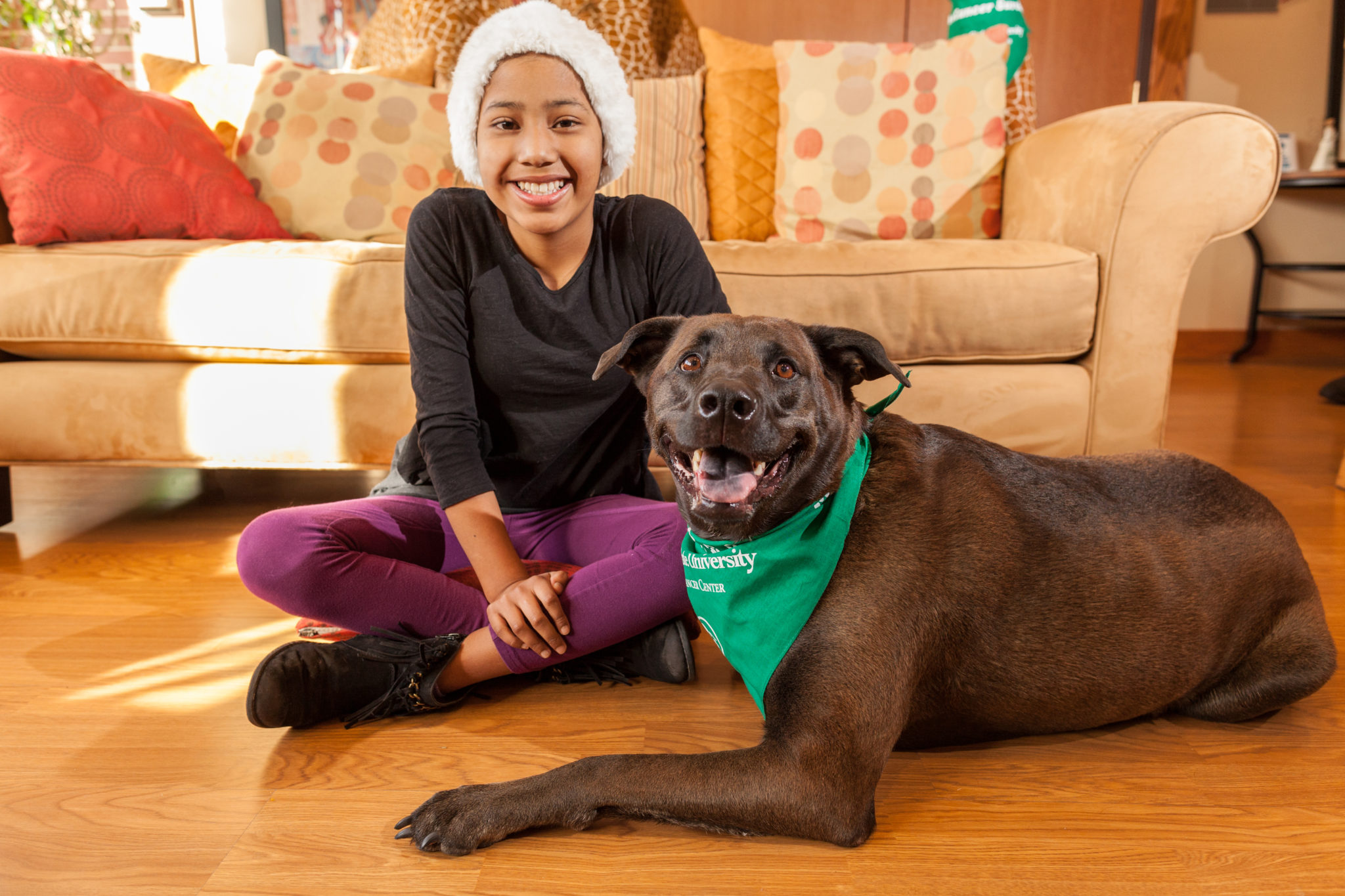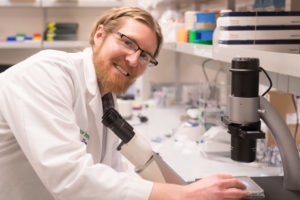
Bone cancer survivors Solei (human) and Alba (canine). Solei had limb-sparing surgery at Children’s Hospital Colorado several years ago and today is a thriving teenager. Alba was diagnosed with osteosarcoma in 2015 and was enrolled in a CSU clinical trial. She passed away in 2019, after living about four times longer than most dogs with standard treatment. Photo credit: Jamie Rowe Photography
Osteosarcoma, the most common type of bone cancer, is a devastating disease that occurs most often in children and can spread to the lungs or other parts of the body. It affects 400-800 young people every year in the United States.
For the past several years, researchers at Colorado State University have been developing a potential new treatment for this rare pediatric cancer. Today, they are about halfway through the first phase of a clinical trial with enrolled patients at Children’s Hospital Colorado and Children’s Healthcare of Atlanta, testing the safety and efficacy of a two-drug immunotherapy combination that has shown promise for shrinking tumors and blocking metastasis.

That earlier promise came from a surprising source: dogs.
Dr. Dan Regan, CSU assistant professor in the Department of Microbiology, Immunology and Pathology, and Dr. Steven Dow, professor in the Department of Clinical Sciences, are performing immune correlative analyses of patient samples from the children’s cancer trial being led by pediatric oncologists in Colorado and Georgia. The study is an almost exact replica of a canine osteosarcoma trial Regan and Dow ran out of CSU’s Flint Animal Cancer Center and wrapped up in 2019, which involved 20 dogs with bone cancer that had metastasized to their lungs.
Their results showed that a common blood pressure medication, losartan, combined with a molecular-targeted cancer drug, toceranib, had positive effects in shrinking or stabilizing bone tumors in 50% of the dogs, with almost 30% experiencing regression in their tumors.
The encouraging results of the losartan study in dogs prompted Regan and Dow to reach out to oncologist colleagues at Children’s Hospital Colorado, all part of the University of Colorado Cancer Center consortium. Dow and Regan proposed a study using losartan in pediatric bone cancer patients with tumor metastases who had failed to respond to conventional treatment. They were able to launch the study in early 2019, working with oncologists including Drs. Lia Gore, Carrye Cost, Margaret Macy and Kelly Faulk in Colorado and Dr. Thomas Cash in Atlanta.
CSU’s leadership in comparative oncology
It’s becoming increasingly clear that researchers who study veterinary and human diseases, particularly cancers, have a lot to learn from each other.
CSU has known this for long time. The University’s College of Veterinary Medicine and Biomedical Sciences and its Flint Animal Cancer Center has produced decades of groundbreaking work in the field of comparative oncology, which is the study of naturally occurring cancers in more than one species.
“We want veterinarians, physicians and Ph.D. scientists to be more aware of the value of the comparative oncology approach, and thus more accepting,” said Regan, a trained pathologist and veterinarian who turned to oncology when he began working in Dow’s lab at CSU in 2011.
Dogs and humans share 85% of their genes, and bone cancer in dogs and humans is genetically indistinguishable. Regan and Dow’s trial, if successful, could cut by years the time it would normally take to develop a pharmaceutical product for pediatric bone cancer patients – and at a greatly reduced cost. It’s efforts like this that illustrate the tantalizing opportunities afforded by comparative oncology, and the ways in which CSU is ahead of the curve.
Another historic example: In the mid-1990s, founding director of the Flint Animal Cancer Center, Dr. Stephen Withrow, pioneered a limb-sparing surgery for dogs with osteosarcoma, improving the standard of care for dogs with the disease whose limbs were usually amputated. That limb-sparing technique was later moved into humans, saving thousands of people, particularly children, the removal of a limb due to cancer.
The Flint Animal Cancer Center continues to lead the way in the field of comparative oncology, with Regan and Dow’s losartan study as a prime example. Others, like Flint Animal Cancer Center radiation oncologist Dr. Keara Boss, are investigating canine head and neck cancers with an eye toward moving her results into humans.
‘Cancer is cancer:’ One Cure awareness campaign
At CSU, comparative oncology is a scientific approach as well as an awareness campaign, and researchers like Regan say it’s more important than ever to bolster public support for the field and to fund clinical trials and researchers working in these areas.
A major player in that awareness campaign is Meg O’Neil, a breast cancer survivor whose dog, Elway, was treated at the Flint Animal Cancer Center in 2011. As O’Neil learned about CSU’s comparative oncology program, she committed her time and talents to the cause, founding a fundraising initiative called One Cure that has now celebrated more than a decade of supporting critical research in pet and human cancers.
One Cure’s foundational principle is that cancer treatment breakthroughs will come through collaborations between scientists and doctors working with pets and people. One Cure’s goal is to improve the prevention, diagnosis and treatment of cancer in pets, and then use that knowledge to benefit people with cancer. “Cancer is cancer,” whether in pets or people, according to the One Cure mission.
‘Tackle Cancer’
Oct. 22 is CSU Football’s annual ‘Tackle Cancer’ game. One Cure is partnering with the football team to raise awareness and achieve a fundraising goal of $20,000 this month for comparative oncology research at CSU. Learn more.
Regan and Dow’s osteosarcoma study was one of several research projects to receive initial funding through One Cure. The Flint Animal Cancer Center’s clinical trials program is currently the largest in veterinary oncology; in 2021, the program managed 29 clinical trials to study effective therapies for a variety of cancers: osteosarcoma, lymphoma, soft tissue sarcoma and brain tumors.
It’s too early to know whether Regan and Dow’s pediatric bone cancer trial will yield the same positive results as it did in dogs. In the next 18 months, they hope to proceed into phase II of the trial, in which they will escalate the dosage on the drug combination and start looking for signs of tumor regression.
“We just want to make a difference – for these kids, too, who are at end stages, have failed a lot of therapies, and have no options but a lot of fight left,” Regan said. As for the work of the Cancer Center and One Cure, Regan said, “CSU sits in this powerful position, with a unique facility, infrastructure and personnel, to try and make a dent, and to turn certain cancers into chronic diseases that are manageable long-term, like heart disease or diabetes.”
Learn more about One Cure and how to support the cause.